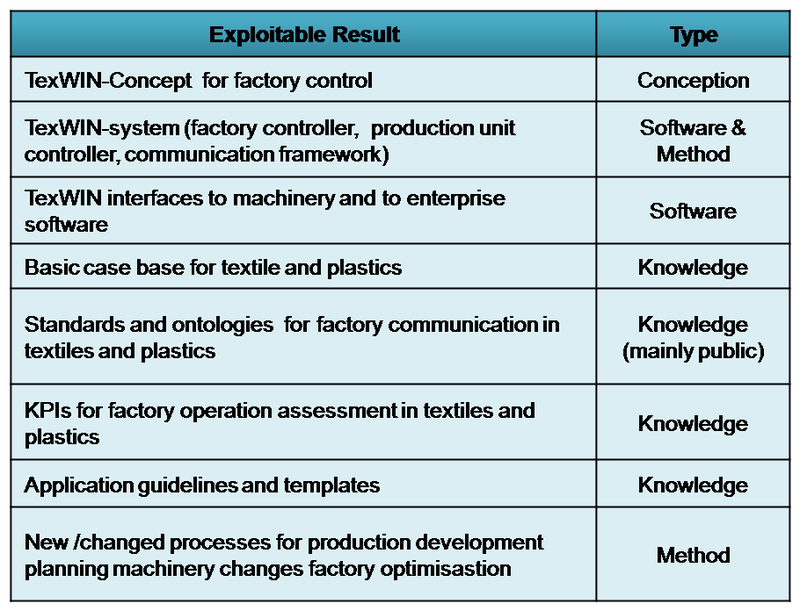European Research Project
European Research Project
|
 Funded by the European
Commission DG Research
FP 7 NMP Project 246193-2
|
 |
Full Title: Textile Work Intelligence by closed-loop control of product and process quality in the Textile Industry
Acronym: TexWIN
Project Number: CP-FP 246193-2 TexWIN
Type of Funding Scheme: Small or medium-scale focused research projects
Work Programm Topic: FP7-NMP-2009-SMALL-3 Adaptive control systems for responsive factories
Duration: 16/03/2010 - 15/03/2013 (3 years)
Costs/Funding/PM: 4.8 Meur./ 3.3 Meur/ 492PM
Summary
The objective of TexWIN is to increase productivity by up to 20% and reduce down-times of machines by one third of workshop factories; due to a reduction of stop times, set-up times and waiting times, increased flexibility and reliability of processes, and due to reduced sampling effort.
The breakthrough is to exploit existing knowledge available in various factory internal and factory external sources by
- combining and evaluating process state information as well as product and material characteristics and
- deriving best production instructions.
Additionally existing production knowledge and experiences from production operators will be preserved and made available by the CBR (Case-Based Reasoning) module.
This will be enabled by the hierarchical control structure "TexWIN-Concept" consisting of an adaptive and modular system "TexWIN-System" and re-engineered "TexWIN-Processes" improving quality of products and processes of workshop factory operations. The TexWIN-System integrates the two following units:
- the factory controller for the improvement of the process schedule and event-based coordination of factory (inter-)operations and
- the adaptive CBR-based production unit controller for identification of best process recipes/machine settings concerning product quality and production process set-up and execution efficiency.
The modules will be integrated into a common communication framework, which will enable flexible interfacing and ontology-based information transformation.
The TexWIN-Processes are adapted factory business processes which allow maximising the efficiency and quality effects and seamless integration into existing factories.
TexWIN, which will be tested within 5 textile and plastic mills, will be best suited for industries dealing basically with make-to-order production, small batches, high-quality product variants, workshop production, complex processes and non-homogeneous and/or natural materials.
OBJECTIVES
Better utilization of manufacturing capacities
- Reduced stop times
- Reduced sampling effort
Better utilization of production facilities
- Higher machine efficiency
- Better product quality
- Increased flexibility
Improvement of development and planning processes
- More and better process and product information
- Consideration of other factors, e.g. CO2 emission of production
Two layers of the Controle Structure:
- Factory Controller: optimisation, harmonisation and coordination of the process chain
- information and specification about quality of the resulting product will be used for optimisation of the production process
- coordination of a running production process provides interfaces to communicate with other Factory Controllers, ERP, and MES
- Production Unit Controller: experience based adaptive control of individual production units
- Case Based Reasoning (CBR)
- creation of a large case base and the adjustment of the adaptation rules by the Analysis module
The scheme of the hierarchical control approach above shows the two main components of the TexWIN system. The Factory Controller facilitates the coordination and optimisiation of the entire plant, whereas the Production Unit Controller helps to optimise the setting of different manufacturing units, using various approaches like Case-Based Reasoning.
BENEFITS
The TexWIN project focuses on research and development activities leading to the following benefits:
Determination of initial machine settings in less time
- Case-Based Reasoning solutions for various textile and plastics production processes
- Integration of information from previous production steps
Optimisation of machine settings
- Adaptation of machine settings based on material and process research
- Closed-loop control structures
Improvement of information flow in factories
- Integration of information from upstream production steps
- Prediction of product and process quality
Optimisation of production chains
- Balancing raw material quality and process performance
- Increasing the flexibility of the production chain by using all available information sources
The results obtained through these activities will be best-suited for industries dealing with make-to-order production, small batch sizes, high-quality products, knowledge-intensive processes or natural materials.
EXPLOITATION OF THE OBTAINED RESULTS

CONSORTIUM
|
Deutsche Institute fuer Textil- und Faserforschung Denkendorf (Germany) Coordinator Fratelli Piacenza S.p.A (Italy) ITEMA (Switzerland) Ltd. (Switzerland) Maschinenfabrik Rieter AG (Switzerland) Domina S.R.L. (Italy) ENEA - Italian National Agency for New Technologies, Energy and Sustainable Economic Development (Italy) Botto Giuseppe S.p.A (Italy) Wetenschappelijk en technologisch onderzoekscentrum voor de Belgische textielnijverheid (Belgium) Milliken Europe BVBA (Belgium) BMS bvba (Belgium) Dyckhoff GmbH (Germany) |
Research centres:
Technology/Service:
Industrial partners:
Â


Share: